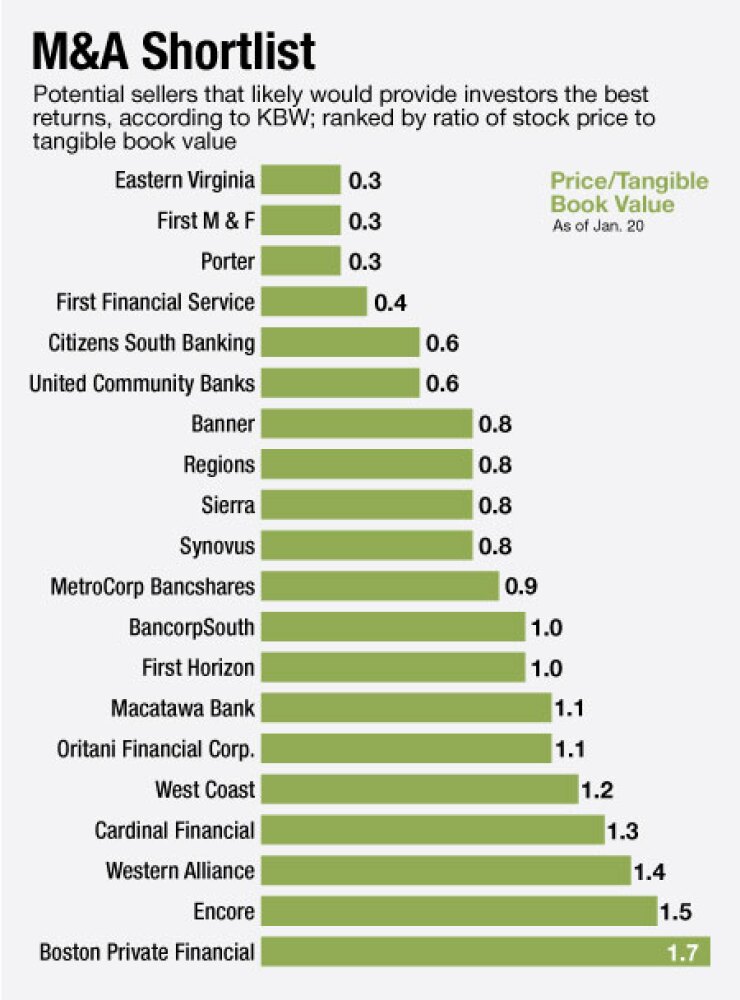-
Kelly King is bullish about BB&T's growth opportunity this year, and he believes the company has many options when it comes to M&A.
January 20 -
PNC CEO James Rohr said more deals are possible after it completes the acquisition of RBC USA, but he vowed to be "very judicious" and said PNC could open new branches where needed.
January 18 -
Kevin Kabat believes Fifth Third Bancorp can boost lending this year, somewhat offsetting low interest rates. He’d like to pursue acquisitions, though he admits that M&A activity may underwhelm again in 2012.
January 4 -
Click on individual bank names in the table below to access American Banker's coverage of each company's earnings report. Links to relevant coverage can be found in the Related Links area of each article.
January 25

Caution is the watchword among executives this earnings season when pressed for insights into their M&A strategy.
Officials at
Most outlined the same three acquisition criteria: Deals that are safe, cheap and pleasing to investors.
"M&A remains an alternative that we monitor closely. It's not something that we are going to push before it's time. I think we will be very disciplined," Fifth Third Chief Executive Kevin Kabat said Friday.
The Cincinnati company's top aim is organic growth, he said, though it may eventually buy banks that can boost its share of existing markets. The timing depends on when bid-ask spreads narrow between buyers and sellers, he said.
"I don't expect that to happen in the near term," he said. "So in all likelihood it would be later in 2012 rather than earlier."
Stephen Steinour, Huntington's chairman and CEO, also stressed customer growth before acquisitions when listing the bank's strategic objectives.
Huntington's "first priority" is to execute its core strategy of attracting customers by minimizing fees and prices — and making a big deal of it, Steinour said in an interview Thursday.
He cited Huntington's solid deposit growth and improved results in 2011 as signs that its no-new-fees strategy is paying off. Huntington has the capital, liquidity and know-how to acquire, Steinour said. But its focus is on taking share, not buying other banks.
"We have a scalable business [in credit cards] and I think we've built a real nice reputation in the business as being a great acquirer."
It has less of an appetite for whole bank deals. It would look at small, low-price deals in markets where it has a presence, Davis said.
"If it's not in our footprint, we're not touching it," Davis said.
The company has the capability to buy large banks, but it is not yearning to do so.
"I think we either have the capital and I know we have the regulator confidence, and I believe the Street would accept a deal if we were to look at something and have a capital raise," Davis said. "But it's not one of our goals. It would have to be something so undeniably good that you didn't want to pass" it up.
John Stumpf, the chairman and CEO of Wells Fargo, said the San Francisco company was cautiously considering deals for specific assets or lines of business. Wells Fargo — like JPMorgan Chase & Co., Bank of America Corp. and Citigroup Inc. — cannot buy any whole banks without special approval because of the 10% national deposit cap.
"We're kicking lots of tires. And our use of capital on the acquisition side will be for businesses that are bolt-on to existing areas of expertise that we have,"
M&T Bank Corp., is positioned — but not desperate — to buy more banks after closing its purchase of Wilmington Trust Corp. of Delaware last year, Rene Jones, the Buffalo company's executive vice president and chief financial officer said on Jan. 17.
"If opportunities come up we're in great shape,"





